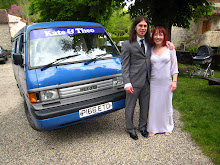Personally, I've always found speaking English very easy. Being English tends to give a useful head-start and I did grow up in the UK with English-speaking parents, so I admit I've had some natural advantages in this area. I remember doing the occasional English grammar lesson at school - indeed, I have an O' level in English Language, which just goes to show how old I am. But most of the rules I learned about the building blocks of language were derived from French, German and Latin lessons. Especially Latin, god bless Mr Eddy.
So, while I was able to conjugate the latin verb, "amare", I was hazy at best when it came to explaining the things I do instinctively to someone who grew up speaking Spanish. Or any other language, for that matter. Enter the CELTA. Despite many years spent as a professional communicator in English, both written and spoken (I was a BBC broadcast journalist for more than a decade), until November this year (2008) I would have struggled to explain when and why you use the present perfect tense and what rules govern its formation.
Now, after four weeks spent learning-to-teach and learning-about-the-language-itself-so-I-can-attempt-to-teach-it at International House, Barcelona, I can make a fair crack at helping students of English through the maze of tenses, shwas and phrasal verbs that make up our wonderful and frustrating tongue.
Actually, one of the most important things I learned during my CELTA course was that we're not actually teaching at all. We are guiding discovery. Our worshipful tutor, Gerard McLoughlin was keen for us to take to heart the following quotation by a seventeenth century man called Von Humbolt: "You cannot teach a language, only create the conditions under which it might be learnt."
Thankfully, nowadays those conditions can include pop music, Youtube clips, lonely hearts adverts and celebrity gossip. Then, there are the old faithful grammar gap-fill exercises and True or False quizzes. Of course, you can teach English - sorry, guide the discovery of English - in more serious ways as well, but the point is, it doesn't have to be a load of dusty old writing exercises, translation tasks and verb-drills. In fact, the most important exercise at all involves the tongue, teeth, lips and jaw. It's called talking. The more your students do - and the less you do - the better. Probably the most important thing I learned doing my CELTA.
So - was gaining my CELTA hard work? Yes. Was it rewarding? Thrice, yes. Was it fun? Oh, yes. What was the best bit? For me, the teaching practice. The satisfaction of realising your students have gained some extra understanding of the English language and are successfully putting it into practice thanks to something you did is hard to equal.
When I began the CELTA course one thing I worried about was that I had misjudged my vocation and teaching was not actually for me - or that the course would kill off any enthusiasm I had for teaching. In fact, Gerard, Susannah, IH Barcelona and all our students have achieved the opposite - I can't wait to get myself in front of more students and start flying the flag for the English language. Now, I just need to elicit myself some paid employment (noun, uncountable).
Monday, 22 December 2008
Subscribe to:
Post Comments (Atom)




Great summary for people who are thinking about taking the CELTA, will try to find some way of mentioning it on my blog.
ReplyDeleteKate,
ReplyDeleteDoing the CELTA course is not likely to diminish your burning desire to get out there and teach - quite the opposite in fact, as it tends to fan the flames of ambition to an almost insatiable degree (if I remember rightly).
However, the experience of teaching might well kill off your enthusiasm to 'get it on' in front of a class. After you've been teaching the same pages of Headache Pre-Intermediate for six years (or months even), you could well feel the urge to ... well, I won't spoil your fun.
BTW, did your Celta tutor let on that your 'voyage of discovery' might well get marooned - or shipwrecked? I mean, you could equally be Columbus ... or Robinson Crusoe!
Good luck, anyway...
my problem with the CELTA was that one never knew exactly what the tutors were looking for. Anyone else have the same problem?
ReplyDeleteLona
Great info for somone thinking about doing a CELTA course - it has fired up my enthusiasm, thanks!
ReplyDeleteThat's a great article Kate. I will be linking to it on my TESOL web sites,forums, and blogs.
ReplyDeleteWith the right motivation, you won't get marooned teaching Headbangers Intermediate for ten years. I'll give your one or two years,and then you will change schools for a better position, and do it over again until you reach the top.
Promotion almost never comes from within a school.